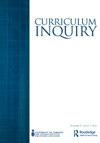You don’t know me: Welcoming gender diversity in schools via an ethic of hospitality
IF 1.6
3区 教育学
Q2 EDUCATION & EDUCATIONAL RESEARCH
引用次数: 1
Abstract
Abstract Canadian public school authorities are busily producing gender diversity policies in order to meet their new legal responsibility to provide an environment free from gender identity and gender expression discrimination. These policies tend to offer specific guidance about how administrators and educators should respond to the needs of particular students: those who are (currently legible to school actors as) somehow transgender. Leveraging Claudia Ruitenberg’s writings on enacting a Derridean ethic of hospitality in education, however, I argue that it is ethical to not intend that policy, pedagogy, and curriculum address the needs of particular children and youth in order to do something about how gender rigidly organizes life in schools. De-centring these subjects does not mean doing nothing about this problem; it means doing something paradoxically impossible, yet ethical precisely because it is so impossible: preparing to welcome a student who may never arrive and who the teacher can never know, gender-wise, even and perhaps especially if there are out transgender students in one’s very own school. I offer three orientations to guide teachers, in particular, towards enacting this welcome: not seeking to know the transgender student in advance of their arrival, not trying to be a good teacher for transgender students in particular, and being wary of curricular representation as a strategy of welcome.你不了解我:通过热情好客的道德来欢迎学校的性别多样性
摘要加拿大公立学校当局正忙于制定性别多样性政策,以履行其新的法律责任,提供一个没有性别认同和性别表达歧视的环境。这些政策倾向于就管理人员和教育工作者应如何回应特定学生的需求提供具体指导:这些学生(目前学校行为者可以识别为)不知何故是跨性别者。然而,利用Claudia Ruitenberg关于在教育中树立德里德好客道德的著作,我认为,不打算让政策、教育学和课程满足特定儿童和青年的需求,以改变性别如何严格组织学校生活,这是合乎道德的。取消这些主题的中心并不意味着对这个问题无所作为;这意味着做一些自相矛盾的不可能的事情,但正是因为这是不可能的,才合乎道德:准备迎接一个可能永远不会来的学生,一个老师永远不会认识的学生,从性别角度来看,甚至可能尤其是如果自己的学校里没有跨性别学生的话。我提供了三个指导,特别是指导教师实施这种欢迎:不要在跨性别学生到来之前寻求了解他们,不要试图成为跨性别学生的好老师,以及警惕课程代表性作为一种欢迎策略。
本文章由计算机程序翻译,如有差异,请以英文原文为准。
求助全文
约1分钟内获得全文
求助全文
来源期刊

Curriculum Inquiry
EDUCATION & EDUCATIONAL RESEARCH-
CiteScore
3.10
自引率
17.60%
发文量
37
期刊介绍:
Curriculum Inquiry is dedicated to the study of educational research, development, evaluation, and theory. This leading international journal brings together influential academics and researchers from a variety of disciplines around the world to provide expert commentary and lively debate. Articles explore important ideas, issues, trends, and problems in education, and each issue also includes provocative and critically analytical editorials covering topics such as curriculum development, educational policy, and teacher education.
 求助内容:
求助内容: 应助结果提醒方式:
应助结果提醒方式:


